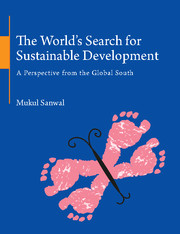Book contents
- Frontmatter
- Dedication
- Contents
- Preface
- Acknowledgments
- Abbreviations
- INTRODUCTION
- 1 Social Dimension of Sustainability
- CONSUMPTION IN AN UNEQUAL WORLD: FRAMING INTERNATIONAL COOPERATION
- CLIMATE POLICY: GLOBAL TO NATIONAL
- SUSTAINABLE DEVELOPMENT: NATIONAL TO GLOBAL
- 12 Conceptual and Institutional Foundation
- 13 Politics within the United Nations
- 14 Limitations of the Building Blocks of Sustainability
- 15 Use of Natural Resources
- 16 Distribution of Natural Resources
- CONSUMPTION IN A MORE EQUAL WORLD: SHAPING SOCIETAL FUNCTIONS
- GEOPOLITICS TO GEOECONOMICS: RURAL–URBAN DIVIDE, RATHER THAN BETWEEN COUNTRIES
- THE ASIAN CENTURY
- Index
15 - Use of Natural Resources
from SUSTAINABLE DEVELOPMENT: NATIONAL TO GLOBAL
Published online by Cambridge University Press: 18 December 2015
- Frontmatter
- Dedication
- Contents
- Preface
- Acknowledgments
- Abbreviations
- INTRODUCTION
- 1 Social Dimension of Sustainability
- CONSUMPTION IN AN UNEQUAL WORLD: FRAMING INTERNATIONAL COOPERATION
- CLIMATE POLICY: GLOBAL TO NATIONAL
- SUSTAINABLE DEVELOPMENT: NATIONAL TO GLOBAL
- 12 Conceptual and Institutional Foundation
- 13 Politics within the United Nations
- 14 Limitations of the Building Blocks of Sustainability
- 15 Use of Natural Resources
- 16 Distribution of Natural Resources
- CONSUMPTION IN A MORE EQUAL WORLD: SHAPING SOCIETAL FUNCTIONS
- GEOPOLITICS TO GEOECONOMICS: RURAL–URBAN DIVIDE, RATHER THAN BETWEEN COUNTRIES
- THE ASIAN CENTURY
- Index
Summary
Human well-being depends on the consumption of goods and services and production depends on the transformation of natural resources, and both impact on the environment in very different ways. There is now a call for a new ‘economics of sustainable development’, or ‘new type of investment’, where, for example, transport is more than just road building and should be environmentally sustainable; adoption of long-term strategies needs to give importance to social capital or trust [Sachs, 2014]. There are calls for ‘a new social contract that rethinks global environmental change research in the ‘new intellectual climate’ to encompass a deeper analysis of societies affecting and affected by global environmental change [Carey et al., 2014]. There are also many calls for the proper integration of the social sciences into the climate change research agenda as a crucial step to fill the science-policy gap [Editorial, 2014]. The fundamental transitions in consumption and production systems will require major changes in institutions, technologies, practices and thinking because these systems rely on infrastructure and investment decisions with long term implications.
Urbanization
No country has substantially reduced poverty without urbanization and greatly increasing the use of energy; most economic activity would be impossible without energy. Over the past two centuries, fossil fuels have made possible mechanical power, lighting and heating substituting animal and human muscle power. In urban areas, changes in consumption patterns, mobility and changes in the diet all lead to changed patterns of natural resource use in increasing levels that are causing ecosystem scarcity at the global level; slow growth increases local environmental impacts.
The distinguishing feature of economic development is the population shift from rural to urban areas, and rising levels of GDP per capita correlate with levels of urbanization, as they generate four-fifth of GDP. In 2007, over one-quarter of the human population lived in cities, consuming three-quarters of all natural resources and was responsible for three-fourth of the world's energy-related carbon dioxide, with transport, industry and building sectors being the largest contributors; this population level will rise to half by 2030 as urbanization continues. Spatial organization, density and lifestyle choices determine trends in natural resource use. Currently, average per capita carbon dioxide emissions embodied in the infrastructure of industrialized counties is five times larger than for developing countries.
- Type
- Chapter
- Information
- The World's Search for Sustainable DevelopmentA Perspective from the Global South, pp. 200 - 210Publisher: Cambridge University PressPrint publication year: 2015



